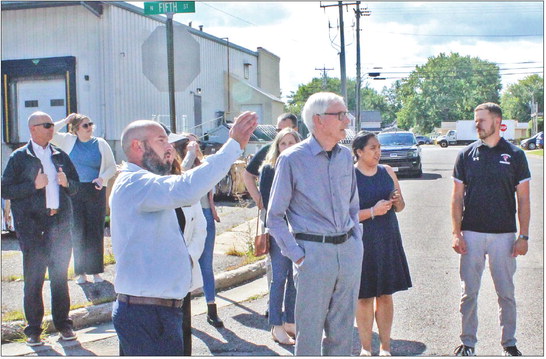Clark Co. puts ICE resolution on hold
The Clark County Board of Supervisors has pushed the pause button on a resolution that would urge local officials to cooperate with federal immigration authorities.
At its meeting last Thursday, the board voted 20-8 to send the resolution to the law enforcement and emergency management committee for further review. Supervisors voting against sending the resolution to committee were Brandon Hasz, Leonard Stoecker, Doris Bakker, Fritz Garbisch, Fred Schindler, Scott Jalling, Al Bower, and Luke Smith. Kathy Brodhagen from District 1, which includes over half of the city of Abbotsford, abstained. The resolution does not change county ordinances or any existing law. If passed, it would be a formal show of support by Clark County government, indicating that the county intends to collaborate and cooperate with Immigration and Customs Enforcement (ICE) in its directives, including the arrest of illegal immigrants.
“Be it resolved that the Clark County Board of Supervisors hereby supports and exhorts all aspects of Clark County government, including but not limited to the Clark County Sheriff’s Office, county agencies and departments, and local law enforcement agencies, to fully cooperate with any lawful requests of federal authorities, including ICE, in the enforcement of immigration laws within Clark County, unless otherwise prohibited by law,” the resolution states.
The resolution was submitted by Brandon Hasz, who is the supervisor for the Town of Fremont Ward 1 and Town of Lynn Ward 1.
The next law enforcement and emergency management committee meeting, at which the resolution will likely be discussed, is scheduled for Sept. 8 at 1:30 p.m. in Room 309 of the Clark County Courthouse, 517 Court St., Neillsville. The meeting is open to the public.
The agenda for that meeting has not been released yet.
Resolution raises concerns
Several members of the public, including a few from the Abbotsford- Colby area, urged the board to allow the committee to review the language of the resolution so that it doesn’t create unwarranted fear among the local immigrant population.
“The last thing I would want to see is some unintended consequences,” said Ryan Bargender, superintendent of the Abbotsford School District, where a majority of the students are Hispanic.
Brian Haines, a lifelong resident of Colby, said he has seen firsthand how the immigrant population has grown since he was in school and there were no Hispanic students. Through their ministry at the Hope Center in Abbotsford, Haines said and he and his wife have worked closely with a lot of immigrants, many of whom didn’t even realize they were violating the law when they crossed the border.
“By far, the vast majority of these people are beautiful, hardworking people,” he said.
At the same time, however, he said even law-abiding immigrants were “full of fear” when President Trump took office again in January, and many were afraid to even leave their houses. He worries that a significant number of these immigrants would leave the area if the county board passed the resolution as is.
“The economic impact on Colby and Abbotsford will be very detrimental,” he said, noting the number of stores and businesses that rely on Hispanics as customers, workers and owners.
Supervisor Hasz, however, said he received a letter of support for his resolution from Colby-Abbotsford Police Chief Alex Bowman, would said his department will always assist a federal agency.
Rep. Karen Hurd (R-Thorp) urged the board to reconsider the language of the resolution in light of Assembly Bill 24, which would require sheriffs to “request proof of legal residence status from anyone held in a county jail for an offense punishable as a felony.” It would also direct sheriffs to comply with any detainers or administrative warrants issued by the Department of Homeland Security.
“We’re just interested in getting criminals off the street,” she said. “We don’t want them in our country. I don’t think anyone here wants somebody that’s done a felony crime here.”
Rep. Hurd, however, also noted that a law passed in the 1990s requires all undocumented immigrants to obtain an Individual Tax Identification Number to ensure they are paying income and Social Security taxes.
“They pay all the taxes that every other citizen pays,” she said.
President Trump has assured the Wisconsin legislature that he is going “to provide a path forward for undocumented individuals who have not committed any crimes,” Hurd said. She noted that crossing the border is a civil offense, not a criminal one.
Hurd said she worries the language of the proposed resolution is “a bit nebulous” and may lead to undocumented immigrants being targeted even though they haven’t committed any criminal offenses.
Hasz pushed back on Hurd’s characterization of his resolution.
“I don’t believe the language here is terribly vague at all,” he said. “What it does specifically say is that we will fully cooperate with any lawful request of federal authorities, including ICE.”
Immigrants speak out
Tony Gonzalez, director of the American Hispanic Association, said he served in the U.S. military under President Reagan, but he now feels at risk of being detained by ICE or deported decades later.
“I can’t believe that today I have to walk around with my passport just to make sure that I don’t accidentally get picked up,” he said.
Gonzalez said most immigrants support a secure border and reforms to the immigration system so that only legal immigrants can work here, but he worries that the resolution would lead to racial profiling and potential violations of Fourth Amendment rights if citizens are picked up by ICE.
With birth rates declining, Gonzalez said the United States and Clark County in particular depends on immigrants to fill job openings.
“We don’t have workers in this county, and not everyone that’s brown is a criminal,” he said.
Alejandro Vasquez said he has lived in Clark County for more than 20 years, and most of the immigrants here are working long days and contributing to the community. He acknowledged problems with immigrants repeatedly receiving citations for driving without licenses and committing alcohol- related offenses, but “the rules are the rules and we need to follow the rules.”
“Believe me, we are people who work for this beautiful country,” he said. “Now, after 34 year, I’m an American citizen.”
Supervisors in support
Besides Hasz, two other supervisors spoke in favor of adopting the resolution as is, without referring it to committee for possible changes.
Supervisor Leonard Stoecker, who represents the Loyal area, said the resolution is nothing more than a directive to follow lawful requests made by the federal government.
“It’s not telling anybody to go out and arrest anybody or any of those kinds of things,” he said. “We’re supporting the United States of America in their efforts and we’re verbalizing that.”
Stoecker later said the resolution “shouldn’t be necessary,” but because of past presidential administrations’ inaction on illegal immigration, the county needs to shoulder its share of the weight to fix the problem.
Supervisor Fred Schindler, who represents Curtiss and the area between Colby and Dorchester, said he agrees with Stoecker that the resolution is just reinforcing the county’s obligation to uphold the laws as written.
“We took an oath a year ago in April to uphold the United States Constitution, the State of Wisconsin Constitution to the best of our ability so help me God,” he said. “This is nothing more than a friendly reminder that we need to do what is proper.”
Governor weigh ins
Gov. Tony Evers, who was in Abbotsford on Tuesday to discuss a grant project, was asked what he thought about Clark County’s proposed resolution and the political division surrounding the enforcement of immigration laws.
Evers said if he were a county board member he would leave it up to local law enforcement to handle any issues involving local residents.
“I’m not going to tell any county what to do, but I do respect the work of the sheriff’s departments and local police to do what they need to do without outside help,” he said.
Gov. Evers also talked about the importance of immigrants to local communities and the state at large, regardless of their legal status.
“A lot of our economy is dependent on folks that may be undocumented,” he said. “That doesn’t mean they’re not doing a good job. That doesn’t mean that they’re not good citizens living in Wisconsin doing the best that they can.”



